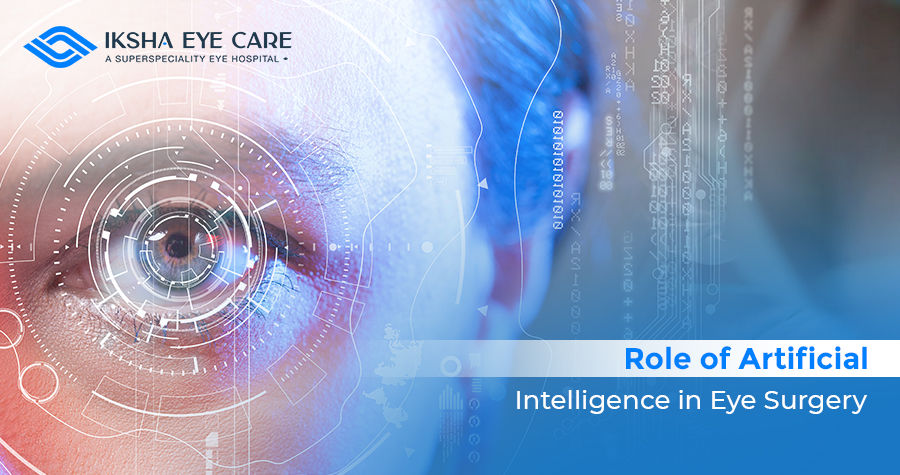In recent years, the incorporation of modern innovations has transformed the world of healthcare. One of the most exciting developments is the application of artificial intelligence in eye surgery. This innovation is changing how ophthalmologists diagnose, treat, and manage vision-related disorders. With enhanced precision, shorter surgical times, and better patient outcomes, AI is proving to be a major changer in the field of eye care.
For individuals looking to profit from these advanced options, Iksha Eye Care stands out as one of the first to adopt AI-powered technology in ophthalmology. Their dedication to innovation, patient safety, and excellent outcomes makes them a reliable option for modern eye treatment in India.
The Rise of AI in Eye Care
AI in eye care is helping clinicians overcome traditional challenges by automating diagnostic processes, understanding complex imaging data, and even assisting with surgeries. Machine learning algorithms based on hundreds of photos and patient data sets are used to detect disorders such as diabetic retinopathy, glaucoma, and age-related macular degeneration (AMD).
Applications in Diagnostics:
- Retinal imaging: Artificial intelligence algorithms can accurately detect microaneurysms, blood loss, and other early symptoms of diabetic retinopathy.
- Glaucoma screening: AI assesses optic nerve degeneration from fundus images, facilitating early diagnosis.
AMD detection: Deep learning models recognize drusen and retinal colour alterations.
Benefits of Artificial Intelligence-Assisted Surgery
These AI-powered diagnostic tools not only improve accuracy but also accelerate the detection process, which is crucial for maintaining vision.
How AI-Assisted Eye Surgery is Improving Outcomes
AI-assisted eye surgery is a big step forward, combining professional surgeons’ skills with the precision of intelligent systems. These technologies are utilized in presurgery planning, real-time operational guidance, and postoperative monitoring.
Benefits of Artificial Intelligence-Assisted Surgery
- Enhanced precision: AI assists in determining exact incision positions and lens positions.
- Reduced human error: Predictive analytics identify probable issues before operation.
- Faster recovery: Optimised surgical pathways and reduced impact result in shorter healing times.
For example, AI-integrated robotic devices in retinal and cataract surgery provide steadier hand movements and greater precision than manual methods.
AI-assisted systems are completely incorporated into Iksha Eye Care’s surgical workflow, ensuring greater safety and predictability for all patients.
AI in cataract surgery: an approach shift.
Cataract surgery is one of the most common operations performed worldwide. The use of AI in cataract surgery has transformed it from a normal process to a highly personalized and precise treatment.
Key enhancements:
- Preoperative planning: AI uses biometric data to select the best intraocular lens (IOL).
- Surgical assistance: Real-time analytics provide direction for corneal incisions and capsulorhexis (opening the lens capsule).
- Postoperative care: Artificial intelligence systems monitor healing and detect issues such as posterior capsule opacification (PCO).
These advancements have resulted in better visual outcomes and increased patient satisfaction.
Cataract procedures at Iksha Eye Care are performed with the most advanced AI-powered technologies, ensuring the highest degree of precision and customized care.
The Future of Eye Surgery with AI
The future of AI-powered eye surgery is promising, with further developments likely to make procedures even more efficient and painless.
Upcoming innovations:
- Autonomous surgical systems: AI-guided robots that can conduct typical surgical tasks without any human assistance.
- Assisted reality (AR): The combination of technological advances and artificial intelligence to provide real-time imagery during surgery.
- Personalized medicine: Includes developing surgical methods based on AI-analysed genetic, biometric, and lifestyle data.
As AI advances, it is likely to manage complex decision-making processes and provide even greater customization in patient care.
Smart Technology in Eye Surgery
Smart technology in eye surgery involves equipment and systems that include indicators and AI capabilities to improve surgical procedures.
Examples of smart technology:
- OCT (Optical Coherence Tomography) technologies that work with artificial intelligence to image tissues in real-time.
- AI-powered microscopes provide dynamic magnification and image clarity.
- Voice-assisted technologies enable surgeons to operate hands-free while accessing important data.
These technologies provide uniformity, precision, and better outcomes across a variety of surgical centers and patient populations.
Iksha Eye Care is at the forefront of using smart surgical equipment to give extraordinary accuracy and safety.
Ethical Considerations and Challenges
While the benefits of AI in eye surgery are great, there are some ethical and technical challenges:
- Data privacy: Ensuring that patient information is protected and utilised properly.
- Algorithmic bias: Reducing inequality in diagnosis and treatment.
- Cost and accessibility: Providing powerful AI systems in underdeveloped countries.
Training and adaptation: Ensuring that surgeons and colleagues are properly trained to use new technologies.
Overcoming these challenges is critical for maximizing the benefits of AI while preserving trust and equity in patient care.
Iksha Eye Care is the top choice for AI-powered eye care.
Patients who choose Iksha Eye Care benefit from world-class AI-driven surgical techniques, friendly experts, and a center that stresses innovation, safety, and excellence in all procedures. As an innovator in the use of artificial intelligence for diagnostics and surgery, Iksha Eye Care continues to lead the way in revolutionizing ophthalmology for better vision and better lives.
For those specifically looking for expert cataract treatment enhanced by advanced AI technology, Iksha Eye Care offers Expert Cataract Eye Surgery in Andheri. Their advanced diagnostic systems, AI-assisted surgical precision, and patient-first approach make them a trusted destination for safe, effective, and personalized vision correction.
Conclusion
The involvement of AI in eye surgery is reshaping the field of ophthalmology. With applications ranging from diagnostics to surgical treatments, AI is ushering in an age of precision, efficiency, and personalized healthcare. As technology advances, so does its ability to prevent blindness, improve vision, and transform lives.
Whether it’s AI in cataract surgery, AI-assisted eye surgery, or smart surgery, one thing is certain: the future of eye care is intelligent, connected, and extremely exciting.
FAQs on Artificial Intelligence in Eye Surgery
Q1: What is Artificial Intelligence in Eye Surgery?
A: It is the application of AI technologies such as machine learning and data analytics to improve surgery planning, execution, and recovery in ophthalmology.
Q2: How is artificial intelligence used to diagnose eye diseases?
A: Artificial intelligence analyzes photos and patient data to detect glaucoma, diabetic retinopathy, and AMD with high accuracy.
Q3: Is AI-assisted eye surgery safe?
A: Yes, it increases precision and decreases complications, resulting in safer procedures and better outcomes.
Q4: Will artificial intelligence (AI) replace eye surgeons?
A: No. AI is intended to aid surgeons, not replace them, by improving their capabilities and eliminating manual errors.
Q5: What is the future of artificial intelligence in eye care?
A: The future includes fully automated surgical systems, personalized treatment plans, and broader access to high-quality eye care.









